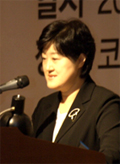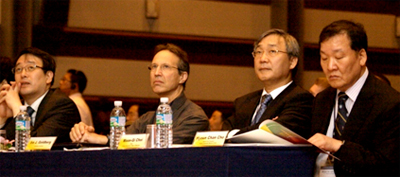Cardiology Has Helped Prolong Human Life: Lee
No.2137 Date2009-06-09 Hit 32511
Cardiology Has Helped Prolong Human Life: Lee
No.2137 Date2009-06-09 Hit 32511
The following remarks were made by Dr. Hae-Ran Lee, president of Hallym University Medical Center, at the opening of the 7th Hallym-Columbia-Weill Cornell-NYP Symposium held at the COEX, Seoul, on June 9, 2009. President Lee welcomed all the participants and expressed her appreciation to the speakers from the U.S. and Korea: -Ed.
Dr. Antonio Gotto, Dr. Allan Schwartz
Chairman Yoon,
Distinguished Guests, Ladies and gentlemen:
 On behalf of Hallym University Medical Center(HUMC), I would like to start by extending a warm welcome to all of you to this 7th Hallym-Columbia-Weill Cornell-NYP symposium today. Let me take this opportunity to express my sincere gratitude to Dean Gotto of Weill Cornell Medical College, Dr. Schwartz, Dr. Goldberg, Dr. Stone, and Dr. Jorde, professors of Columbia University, for their generosity to accept our invitation to this meaningful occasion. My thanks also go to Dr. Jong-Koo Lee, Director of the Korea Centers for Disease Control and Prevention, Dr. Young Bae Park, Chairman of the Korean Society of Cardiology, and all speakers and chairs of the symposium for their time available to join us today.
On behalf of Hallym University Medical Center(HUMC), I would like to start by extending a warm welcome to all of you to this 7th Hallym-Columbia-Weill Cornell-NYP symposium today. Let me take this opportunity to express my sincere gratitude to Dean Gotto of Weill Cornell Medical College, Dr. Schwartz, Dr. Goldberg, Dr. Stone, and Dr. Jorde, professors of Columbia University, for their generosity to accept our invitation to this meaningful occasion. My thanks also go to Dr. Jong-Koo Lee, Director of the Korea Centers for Disease Control and Prevention, Dr. Young Bae Park, Chairman of the Korean Society of Cardiology, and all speakers and chairs of the symposium for their time available to join us today.
Since Hallym reached an international affiliation agreement in 2002 with Columbia University and 2004 with Weill Cornell University and NYP, we have discussed a wide range of social and medical issues such as anti-aging, endocrinology, pediatrics, artificial organs, genetic therapy, robotic surgery, neurodegenerative disease, arthroplasty and spine surgery in New York and Seoul through last six symposiums, which turned out to be contributory to broadening the horizon of our understanding of medical science and medical standards of both Korea and the U.S.
 I would say cardiology that we will be focusing on today is the very area that has already significantly contributed to prolonging human life, and even it keeps advancing day by day. As we are well aware, Columbia and Weill Cornell Universities have global reputation and authority in this field.
I would say cardiology that we will be focusing on today is the very area that has already significantly contributed to prolonging human life, and even it keeps advancing day by day. As we are well aware, Columbia and Weill Cornell Universities have global reputation and authority in this field.
In this vein, it is a rare privilege and honor for all of us today to listen to valuable and insightful views on cardiovascular diseases by the world's most respected and accomplished professionals who have long pioneered in cardiology.
Today we are gathered here in Seoul to share more of our knowledge and solid experiences under the theme, "How to Cope with Global Pandemic of Cardiovascular Disease" which will cover all areas from ways to prevent cardiovascular diseases to new therapies. As we all recognize, the number of patients with cardiovascular diseases is rapidly increasing these days due to an aging society and dramatic changes of our life style. Such diseases are presenting a serious threat to the health of all mankind. Fortunately, however, we are witnessing significant developments in clinical therapies and prevention. Thus, I expect the symposium today will be an excellent chance to discuss new therapies and prevention of cardiovascular diseases.
My concern today is that we will not have enough time for discussion due to a tight-knit program. I truly hope this valuable occasion may not sufficiently help us broaden our academic knowledge, but on a brighter side, such tightness would leave sufficient room for future discussion and exchanges of ideas in the days to come.
In my capacity as president of HUMC, I would like to give my thanks to Dean Gotto for coming a long way from New York, and Dr. Schwratz for helping organize this program, and the Hallym faculty members for their extraordinary work they have done in preparing for this symposium. Renewing my gratitude to all the participants for your presence today, I wish this meeting could be most productive and rewarding.
Thank you.